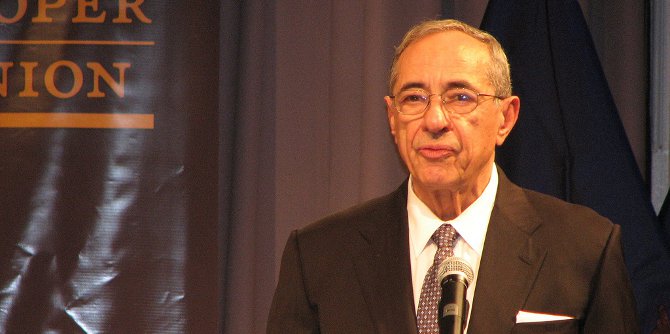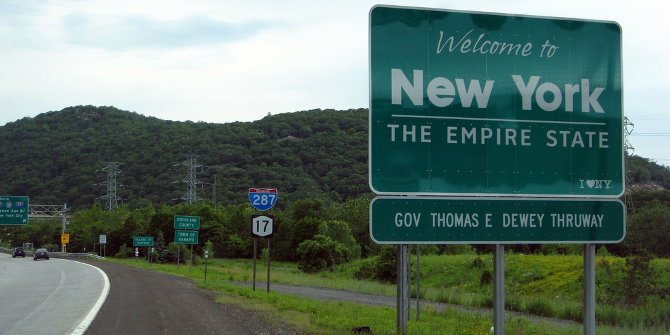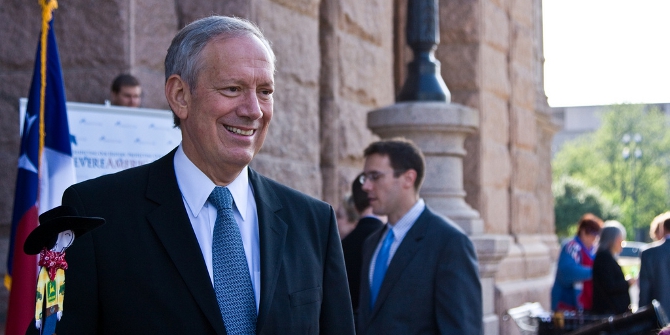 The former Governor of New York, Mario Cuomo, died on January 1st, prompting many to look back at his political life and what current politicians may be able to learn from his legacy. Richard Brodsky writes that Hillary Clinton, the Democrats’ likely candidate in the 2016 presidential election, would do well to follow in Cuomo’s footsteps by embracing and emphasizing a moral and ethical vision of how politics can help improve people’s lives.
The former Governor of New York, Mario Cuomo, died on January 1st, prompting many to look back at his political life and what current politicians may be able to learn from his legacy. Richard Brodsky writes that Hillary Clinton, the Democrats’ likely candidate in the 2016 presidential election, would do well to follow in Cuomo’s footsteps by embracing and emphasizing a moral and ethical vision of how politics can help improve people’s lives.
Unlike European dynasties, the tradition of politically powerful American families is driven by talent and circumstance. A hundred years ago the Roosevelts, Tafts and Longs played the feature role. In our century, the Bushes, Clintons and to an extent, the Cuomos have dominated. There’s rivalry aplenty. But events are creating an unusual opportunity for inter-dynastic instruction.
It’s widely judged that any Presidential ambition that New York Governor Andrew Cuomo may harbor is blocked by Hillary’s preeminence in 2016. And the history of the Clinton/Cuomo relationship is well known and worth considering. The “what-ifs” are legion and fascinating. What If Mario had run in ’84, ’88 or ’92? Would Bill have ever become President? What If Mario had accepted Clinton’s offer to serve on the Supreme Court?
Don’t forget the perception that Bill couldn’t hold a candle to Mario’s bright star, largely resulting from the blockbuster keynote Cuomo gave in 1984 and Clinton’s disastrous nomination of Mike Dukakis in 1988.
All that has faded away, and Clinton remains the flawed but successful President while Cuomo is the philosopher king who turned his back on power. Clintonian political triangulation trumped Cuomo’s Talmudic (Aquinian?) exploration of the soul and its usages. Or did it?
Hillary now comes with the opportunity and need to define herself and her vision. She’ll have no trouble calculating and triangulating, all part of a successful campaign. But she needs to learn from Mario and to heed the core lesson that we can learn by contemplating Mario’s life and impact. Mario made a virtue of the duty to talk about, struggle with and choose the moral and ethical vision that informs the exercise of power. We want to know why you do what you do, not just the policies and politics. His recent passing has highlighted how important that can be.

In retrospect, the winner of recent presidential elections was able to convey a Cuomoesque concern for value based politics. George Bush was compassionately concerned; Gore and Kerry were more doctrinaire. Obama energized the disenfranchised and spoke for us; McCain and Romney were off balance and uncomfortable with the rightward trend of their party and campaign.
It seems simple. Hillary needs to channel the very themes that Mario spoke for, Americans as a family; government as a protector of families; the real dilemmas of economic survival for average people. And it’s not just mouthing the words, or wonking the policies. Hillary needs to find genuine connection with people. There was a tearful moment of that in 2008, after all seemed lost, when she put her vulnerability on display. That won’t work again, but there are plenty of other ways to let Americans know that she is as concerned with the human condition as she is tough and smart. She needs to start now.
I was present for the Cuomo speech in 1984 and the Clinton speech in 1988. I worked with Mario in the State Legislature for 12 years. He asked me once about a speech he gave in my home district. I think he expected an analysis of whether people liked the speech. Instead I told him that he had become the custodian of public discourse and language. The words he had used were persuasive, but more importantly they elevated his listeners, made them colleagues and equals, partners in the public debate and politics. That, I said, was more lasting and more important than the ideas or politics of the moment. He didn’t say anything, just nodded and smiled.
The raising-up of public discourse and the practical political value of an ethical vision were his lasting contributions and they truly matter. I suspect, I hope, that the winner in 2016 will do the same thing. And that he, or she, pauses to thank Mario for setting that standard.
A version of this article first appeared at the Huffington Post.
Please read our comments policy before commenting.
Note: This article gives the views of the author, and not the position of USApp– American Politics and Policy, nor of the London School of Economics.
Shortened URL for this post: http://bit.ly/1yf3Eqy
_________________________________
 Richard Brodsky – Demos & NYU Wagner
Richard Brodsky – Demos & NYU Wagner
Richard Brodsky served 14 terms as a New York State Assemblyman, retiring in 2010. He is currently a Senior Fellow at Demos, a progressive think tank in New York City, and a Senior Fellow at New York University’s Wagner School of Public Administration. His years of public service focused on government reform, environmental protection and economic policy. He is also a lawyer and a journalist. Follow Richard Brodsky on Twitter: www.twitter.com/richardbrodsky.






